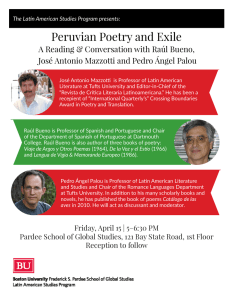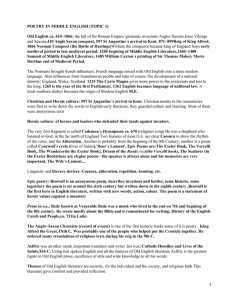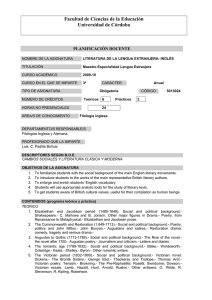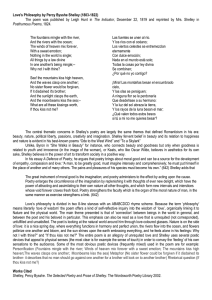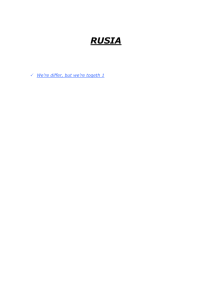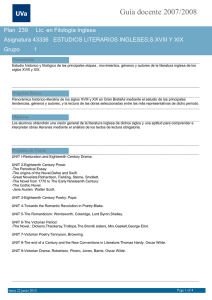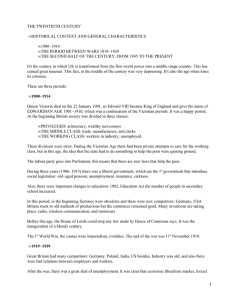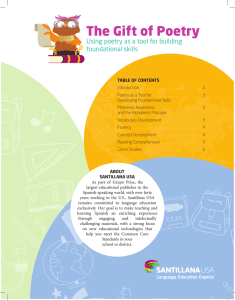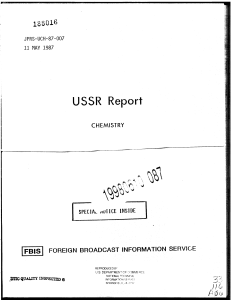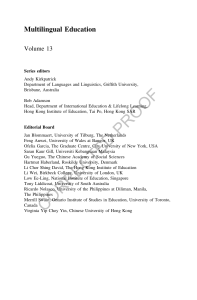Russian Avant-Garde Poetry Seminar Syllabus
Anuncio
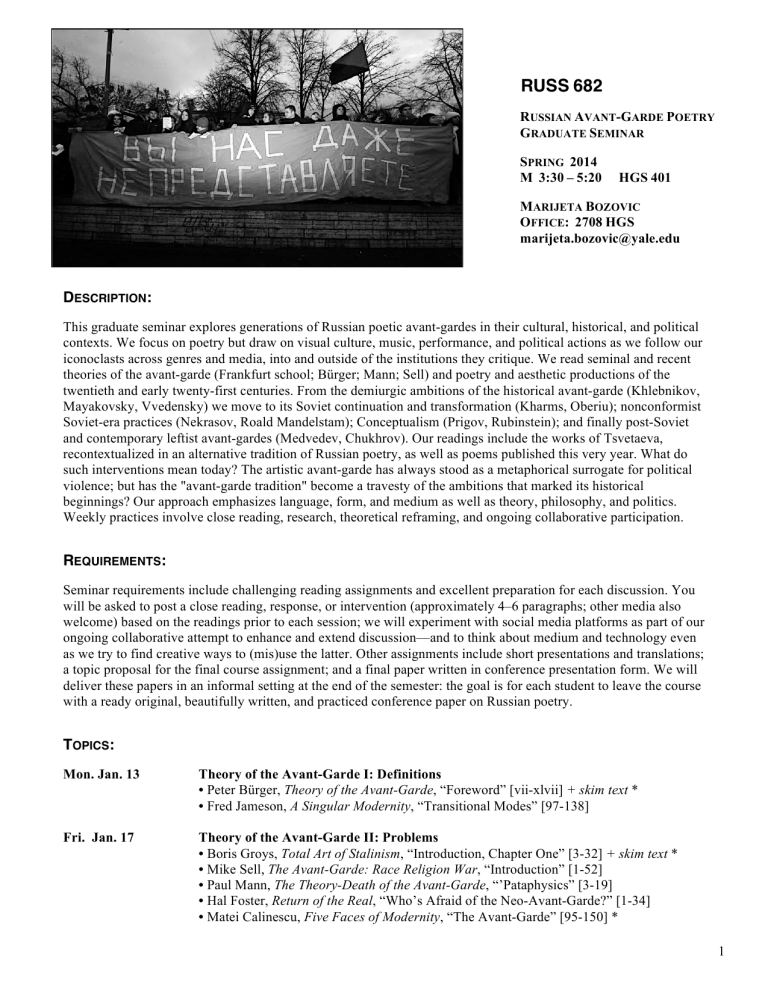
RUSS 682 RUSSIAN AVANT-GARDE POETRY GRADUATE SEMINAR SPRING 2014 M 3:30 – 5:20 HGS 401 MARIJETA BOZOVIC OFFICE: 2708 HGS marijeta.bozovic@yale.edu DESCRIPTION: This graduate seminar explores generations of Russian poetic avant-gardes in their cultural, historical, and political contexts. We focus on poetry but draw on visual culture, music, performance, and political actions as we follow our iconoclasts across genres and media, into and outside of the institutions they critique. We read seminal and recent theories of the avant-garde (Frankfurt school; Bürger; Mann; Sell) and poetry and aesthetic productions of the twentieth and early twenty-first centuries. From the demiurgic ambitions of the historical avant-garde (Khlebnikov, Mayakovsky, Vvedensky) we move to its Soviet continuation and transformation (Kharms, Oberiu); nonconformist Soviet-era practices (Nekrasov, Roald Mandelstam); Conceptualism (Prigov, Rubinstein); and finally post-Soviet and contemporary leftist avant-gardes (Medvedev, Chukhrov). Our readings include the works of Tsvetaeva, recontextualized in an alternative tradition of Russian poetry, as well as poems published this very year. What do such interventions mean today? The artistic avant-garde has always stood as a metaphorical surrogate for political violence; but has the "avant-garde tradition" become a travesty of the ambitions that marked its historical beginnings? Our approach emphasizes language, form, and medium as well as theory, philosophy, and politics. Weekly practices involve close reading, research, theoretical reframing, and ongoing collaborative participation. REQUIREMENTS: Seminar requirements include challenging reading assignments and excellent preparation for each discussion. You will be asked to post a close reading, response, or intervention (approximately 4–6 paragraphs; other media also welcome) based on the readings prior to each session; we will experiment with social media platforms as part of our ongoing collaborative attempt to enhance and extend discussion—and to think about medium and technology even as we try to find creative ways to (mis)use the latter. Other assignments include short presentations and translations; a topic proposal for the final course assignment; and a final paper written in conference presentation form. We will deliver these papers in an informal setting at the end of the semester: the goal is for each student to leave the course with a ready original, beautifully written, and practiced conference paper on Russian poetry. TOPICS: Mon. Jan. 13 Theory of the Avant-Garde I: Definitions • Peter Bürger, Theory of the Avant-Garde, “Foreword” [vii-xlvii] + skim text * • Fred Jameson, A Singular Modernity, “Transitional Modes” [97-138] Fri. Jan. 17 Theory of the Avant-Garde II: Problems • Boris Groys, Total Art of Stalinism, “Introduction, Chapter One” [3-32] + skim text * • Mike Sell, The Avant-Garde: Race Religion War, “Introduction” [1-52] • Paul Mann, The Theory-Death of the Avant-Garde, “’Pataphysics” [3-19] • Hal Foster, Return of the Real, “Who’s Afraid of the Neo-Avant-Garde?” [1-34] • Matei Calinescu, Five Faces of Modernity, “The Avant-Garde” [95-150] * 1 Mon. Jan. 27 Avant-Gardes Across Media • images from The Russian Avant-Garde Book, look through plates [61-249] * • Katy Clark, Petersburg, “Revolution as Revelation” [29-53] • Gerald Raunig, Art and Revolution, “Disruptive Monsters” [131-170] • Pamela Kochagin, Making Modernism Soviet, “Introduction” + “Moscow Museum of Painterly Culture” [xvii-xxiii; 3-36] • Maria Gough, The Artist as Producer, “Introduction” + “Conclusion” [1-20; 191-194] • Marjorie Perloff, The Futurist Moment, “The Invention of Collage” [42-79] • Johanna Drucker, The Visible Word, “Semiotics, Materiality, and Typographic Practice” + “Visual and Literary Materiality in Modern Art” [9-48; 49-90] * Mon. Feb. 3 Avant-Gardes Across Nations • Octavio Paz, Children of the Mire, “A Tradition Against Itself,” etc. [1-57] * • Martin Puchner, Poetry of the Revolution, “Dada and Internationalism” [135-165] • Sanja Bahun-Radunovic & Marinos Pourgouris, Laura Cela-Minjares, The Avant-Garde and the Margin, “Introduction” + “Tristan Tzara Places a Double Bet” [xii-xx; 1-25] • Alice Reeve-Tucker & Nathan Waddell, Caroline Edwards, Utopianism, Modernism, and Literature, “Introduction” + “Ernst Bloch’s Literary Criticism” [3-18; 204-218] • Esther Leslie, Hollywood Flatlands, “Preclusion: experi-mental” + “zeros, dots and dashes: drawing and the European avant-garde [1-32; 33-79] • Marjorie Perloff, The Futurist Moment, “Profond Aujourd’hui” + “Violence and Precision” [2-41; 80-115] Mon. Feb. 10 Kruchenykh • Kruchenykh, “”Новые пути слова” • Kruchenykh, “”Дыр бул шыл”, “Фрот фрон ыт”, “ЗАБЫЛ ПОВЕСИТЬСЯ”, “Я в ЗЕМЛЬЮ ВРОС”, “Русь”, “Смерть художника”, “Евген. Онегин в 2 строч”, “ХАРЛАМИ ВОЮ САПУЛЬНУЮ”, “Искариоты вы” • Charlotte Douglas, Russian Literature Triquarterly 12 (1975) “Views From the New World: Kruchenykh and Malevich” [352-370] • Gordon McVay, Russian Literature Triquarterly 13 (1976) “Kruchenykh: Bogeyman of Russian Literature” [571-590] • Nikolai Firtich, SEEJ 48.4 (2004), “Worldbackwards: Lewis Carroll, Aleksei Kruchenykh and Russian Alogism” [593-606] • Marjorie Perloff, The Futurist Moment, “The Word Set Free: Text and Image” [116-161] • Deborah Wye, Russian Avant-Garde Book, “Art Issues/Book Issues” [10-23] * • Nina Gurianova, Russian Av-G Book, “A Game in Hell, hard work in Heaven” [24-32] * • Gerald Janacek, Russian Avant-Garde Book, “Kruchenykh contra Gutenberg” [41-49] Mon. Feb. 17 Khlebnikov (the logic of beyond sense) • Khlebnikov & Kruchenykh, “Слово как таковое” • Khlebnikov, “Слово”, “Там, где жили свиристели”, “Заклятие смехом”, “Боэоби пелись губы”, “Кузнечик”, “Слоны бились бивнями так…”, “Когда умирают кони”, “Гонимый—кем, почем я знаю?”, “Курган”, “Годы, люди и народы”, “Ветер— пение”, “Весны пословицы и скороговорки”, “Иранская песня”, “Русь, ты вся поцелуй на морозе!” • Gumilev, “Статьи и заметки о русской поэзии” (fragment 31) • Roman Jakobson, Poetics Today 2.1a (1980), “Subliminal Verbal Patterning in Poetry” [127-136] • Marjorie Perloff, 21st Century Modernism, “Khlebnikov’s Soundscapes” [121-153] • John McKay, Inscription and Modernity, “Absolutely Mundane Language” [165-169] • Raymond Cook, Velimir Khlebnikov, “The Tower of the Word,” etc. [67-160] * • Charlotte Douglas, ed. The King of Time “Introduction” (1-10) † 2 Mon. Feb. 24 Mayakovsky • Mayakovsky, “А вы могли бы?”, “Нате”, “Послушайте”, “Я все-таки”, “Скрипка и немножко нервно”, “Вот так я сделался собакой”, “Себе, любимому, посвящает эти строки автор”, “Наш марш”, “Хорошее отношение к лошадям”, “Приказ по армии искусств”, “Необычайное приключение...”, “Юбилейное”, “Небоскреб в разрезе”, “Бруклинский мост”, “Сергею Есенину”, “Товарищу Нетте, пароходу и человеку”, “Стихи о советском паспорте”, “Я знаю силу слов...”, “Я люблю” • Mayakovsky, Облако в штанах; Во весь голос • Viktor Shklovsky, Mayakovsky and his Circle, [selections] • Edward J. Brown, Mayakovsky: A Poet in the Revolution, [selections] * • Tim Harte, Fast Forward, “Avant-Garde Poetry in Motion,” etc. [31-98] • Clare Cavanagh, Rereading Russian Poetry, “Whitman, Mayakovsky…” [202-222] • Michael Holquist, Yale French Studies 39, “The Mayakovsky Problem” [126-136] • Charles Moser, Russian Review 25.3 (1966), “Mayakovsky and America” [242-256] Mon. Mar. 3 Tsvetaeva & Pasternak • Tsvetaeva,“Кто создан из камня, кто создан из глины...”, “Федра”, “Магдалина”, “Попытка ревности”, “Рас-стояние: версты, мили...”, “Куст” • Tsvetaeva Поэма горы, Поэма конца, Крысолов • Pasternak,“Февраль. Достать чернил и плакать!”, “Сестра моя – жизнь...”, “Зеркало”, “Так начинают. Года в два...”, “Поэзия”, “Смерть поэта”, “Душа” • Tomas Venclova, Собеседники на пиру, “«Поэма Горы» и «Поэма Конца» ” [163-173] • Lilly Feller, Double Beat, “Correspondence with Rilke and Pasternak” [168-180] • Peter Brooks, Body Word, “Transgressive Bodies” [257-288] * • Barbara Johnson, Mother Tongues, “Correctional Facilities” [1-25] * • Olga Sedakova, Rereading Russian Poetry, “Toward a Poetology of Pasternak” [71-77] • Boris Gasparov, Борис Пастернак, “Мир в зеркале” + “Два поэта” [194-216] • Tomas Venclova, Собеседники, “Из наблюдений над стихами Пастернака” [332-345] Mon. Mar. 24 Kharms, Zabolotsky • Kharms,“Баня”, “Говор”, “Виктору Владимировичу Хлебникову”, “Шел Петров однажды в лес”, “Однажды утром воробей”, “Кика и кока”, “Тише целуется”, “Прогулка”, “В гостях у Забалоцкого” • Zabalotsky,“Торжество земледелия”, “Дождь”, “Лебедь в зоопарке” • Eugene Ostashevsky, Oberiu, “Introduction” [xiii-xxxiii] • Anthony Anemone & Peter Scotta, Phenomenon Out of Ordinary, “Introduction” [9-43] • Graham Roberts, The Last Soviet Avant-Garde, “Introduction” + “Authors…” [1-74] * • Craig Brandist, Comparative Literature 49.1 (1997), “Deconstructing the rationality of terror: Blake and Kharms” [59-75] • Branislav Jakovlevic, Danil Kharms, [selections] • Sarah Pratt, NZ: Enigma and Cultural Paradigm, “The Last Gasp,” etc. [63-148] * Mon. Mar. 31 Vvedensky, Vaginov • Vvedensky,“Элегия”, “Приглашение меня подумать”, “Значение моря”, “Больной который стал волной”, “Седьмое стихотворение”, “Все”, “Мне жалько что я не зверь”, “Некоторое количество разговоров (fragments)” • Vaginov,“Хотел он, превращаясь в волны”, “Он с каждым годом уменьшался”, “Ночное пьянство”, “Пред Революцией громадной”, “Кентаврами восходят поколенья”, “В аду прекрасные селенья” • Eugene Ostashevsky, Vvedensky: An Invitation for Me to Think, “Introduction” [vii-xxv] • R. R. Milner-Gulland, Slavonic and East European Review 48.112 (1970), “Vvedensky’s Elegy” [424-426] • Alice Nakhimovsky, Ulbandus 1 (‘77), “About Vvedensky’s ‘Conversations’” [107-137] • Dmitrii Manin, Scientific Study of Literature 2.2 (2012), “The right word in the left place: 3 Measuring lexical foregrounding in poetry and prose” [273-300] • Alexander Skidan, Сумма поэтики, “Голос Ночи: Вагинов” [16-23] • Mark Lipovetsky, Паралогии, “Аллегория автора” + “Аллегория письма” [115-180] * • Graham Roberts, The Last Soviet Avant-Garde, “Rereading Reading,” etc. [75-178] * Mon. Apr. 7 Oleinikov, R. Mandelstam, Nekrasov • Oleinikov,“Муха”, “Чарльз Дарвин”, “Послание артистке одного из театров”, “Служение науке”, “О нулях” • R.Mandelstam,“Новая голлания”, “Алый трамвай”, “Когда-то в утренной земле”, “Когда я буду умирать” • Nekrasov,“наверно уже не рано”, “кто куда”, “и стало быть”, “кто куда”, “боишься”, “жили же люди”, “луна”, “человечество”, “и то сказать (тоска)” • Thomas Epstein, Russian Review 60.2 (2001), “NO’s Dark and Stingy Muse” [238-258] • E.V. Voskoboeva, Известие РГПУ (2009), “Своеобразие жанровой системы O” [online] • Kirill Medvedev, “Роальд Мaндельштам” [online] • Konstantin Kuzminsky, “Роальд Мaндельштам (в 6-ти частях)” [online] • Gerald Janacek, Slavonic & East European Review 70.3 (1992) “Minimalism in Russian Poetry: VN” [401-419] • Gerald Janacek, SEEJ 33.2 (1989) “Vsevolod Nekrasov: Master Paronymist” [275-292] • from I Live I See: Selected Poems, trans. Ainsley Morse and Bela Shayevich, [selections] • Assignment: Topic proposal for final papers and discussion Mon. Apr. 14 Conceptualism. Prigov, Rubinshtein, Kibirov • Prigov,“Я устал уже на первой строчке”, “Вот я, предположим, обычный поэт”, “Когда я размышляю о поэзии”, “Мои неземние страдания”, “Образ Рейгана в Советксой литературе”, “Открытое письмо”, “Банальное рассуждение” • Rubinshtein,“Маленькая ночная серенда”, “С четверга на пятницу” • Kibirov,“Когда был Ленин маленьким” • Alexei Yurchak, Everything was Forever, “Dead Irony” [228-38] • Alexander Skidan, Сумма поэтики, “Голем советикус: Пригов” [264-285] • Mikhail Esptein, Endquote, “Postmodernism, Communism, and Sots-Art” [3-31] • Boris Groys, Endquote, “Text as Ready-Made Object” [32-45] • Evgeny Dobrenko, Endquote, “Prigov and the Aesthetic Limits of Sots-Art” [77-106] • Gerald Janacek, Endquote, “Lev Rubinshtein’s Early Conceptualism” [107-122] • Gregory Freidin, Endquote, “Transfiguration of Kitsch—Timur Kibirov” [123-145] • Boris Groys, History Becomes Form, “Moscow Romantic Conceptualism” + “Monastyrskii: Living in Art” [35-56; 145-152] • Marek Bartelik, Moscow Conceptualism, “Banner Without a Slogan” [2-23] * • Alla Rosenfeld, Moscow Conceptualism, “Word and/s Image” [178-234] * • M. J. Jackson, The Experimental Group, “Rituals of Nonlife” [133-168 + 210-212] * Mon. Apr. 21 Free verse, language poetry. Dragomoshchenko, Parshchikov • Dragomoshchenko,“Слышать и видеть”, “Do not a gun”, “Имя речи—Пенелопа”, “Мы видим лишь то, что мы видим”, “Говорит о поэзии значит говорит о ничто”, “Опыты визуальной поэзии” • Parshchikov,“Выбор места”, “Разговор редактора с поэтом” • Alexander Skidan, Сумма поэтики, “Познание пыли: Драгомощенко” [119-126] • Stephanie Sandler, Contemporary Literature 46.1 (2005), “Dragomoshchenko, Hejinian, and the Persistence of Romanticism” [18-45] • Barrett Watten, Postmodern Culture 3.2 (1993), “Post-Soviet Subjectivity” • Marjorie Perloff, Postmodern Culture 3.2 (1993), “Russian Postmodernism: An Oxymoron?” • Artem Magun, Negative Revolution, “The Russian Anti-Communist Revolution” [15-45] • Martin Puchner, Poetry of the Revolution, “Debord’s Society,” etc. [220-264] 4 • Svetlana Boym, Another Freedom, “Dissent, Estrangement, Ruins of Utopia [201-254] • Marjorie Perloff, 21st Century Modernism, “Modernism at the Millennium” [154-200] * • Daniel Kane, What is Poetry, “Introduction” [1-25] * Mon. Apr. 28 Radical poetics Post– • surprise selections from: Kirill Medvedev, Aleksandr Skidan, Pavel Arseniev, Dmitry Golynko, Roman Osminkin, Keti Chukhrov • Alexander Skidan, Сумма поэтики, “Свобода отрубленной головы: Бренер” [95-100] • Alexander Skidan, Сумма поэтики, “Конец перемирия: Медведев” + “Политическое/поэтическое” [101-110; 286-294] • Marta Dziewanska, Ekaterina Degot, Ilya Budraitskis, Post-Post Soviet?, “Fucking Winter Outside” + “Political Guide to Contemporary Russian Poetry” [89-102; 221-236] • Petr Pavlensky + Anatolii Ulianov, Критика: Чего чохешь окупай, “О фатальной стандартизации практик современного искусства” + “Искусство—это производное импульса свободы” [94-99;100-105] • M. Bozovic, Zeitschrift für Slavische Philologie 70 (2014), “Poetry on the Front Line” * • Boris Groys, Art Power, “Art in the Age of Digitalization” etc. [83-92; 93-100] * • Svetlana Boym, Another Freedom, “Introduction: Freedom as Co-creation: [1-36] * TBA Final meeting and paper presentation 5 6

